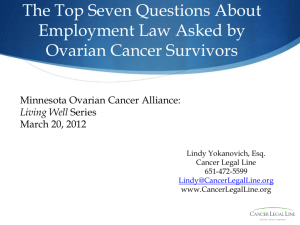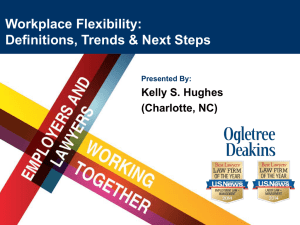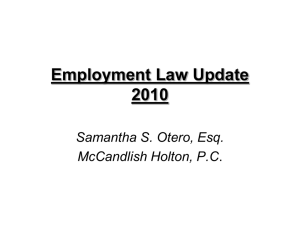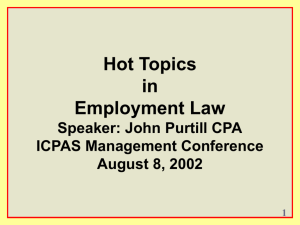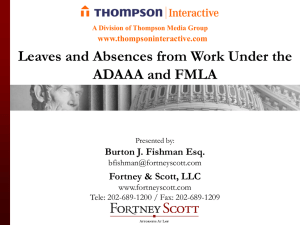Employment Law Update: What HR Executives Need To Know
advertisement
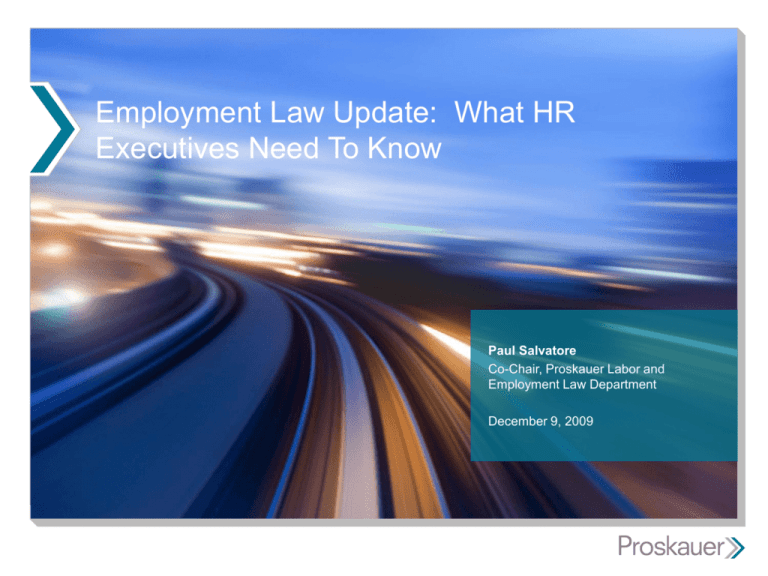
Employment Law Update: What HR Executives Need To Know Paul Salvatore Co-Chair, Proskauer Labor and Employment Law Department December 9, 2009 Today’s Topics • Americans With Disabilities Act Amendments Act • Family and Medical Leave Act • Lilly Ledbetter Fair Pay Act • Supreme Court Update • Employee Free Choice Act • NLRB Update • On the Horizon 2 16778221_1 Americans With Disabilities Act Amendments Act 3 16778221_1 ADAAA • The Americans with Disabilities Act (“ADA”): - Enacted in 1990 Protects the disabled in public and social settings, including employment Prohibits discrimination Requires reasonable accommodation absent undue hardship • ADA Amendments Act (“ADAAA”): - 4 Enacted on September 25, 2008 Effective January 1, 2009 Clarifies disability definition found in the ADA Broadens number of individuals who will be covered under the ADA Focus is now directed to whether a qualified individual has been discriminated against on the basis of his or her disability, rather than on whether the individual is a person with a disability 16778221_1 Summary of Changes Under the ADAAA ADA 5 ADAAA Disability The ADA defines “disability” as: (1) a physical or mental impairment that substantially limits one or more of the major life activities of such individual; (2) a record of such an impairment; or (3) being regarded as having such an impairment. While the amendments fundamentally maintain the ADA’s “disability” definition, the ADAAA takes several steps to achieve a broader, more generous interpretation and application of these terms. Substantially Limits Impairment must prevent or severely restrict a major life activity. Definition lies somewhere between the demanding standard that applied under the ADA and an impairment. Major Life Activities Activities of central importance to daily life. Identifies a non-exhaustive list, which includes general limitations and operation of a major bodily function. Regarded As Focus on whether “regarded as” having substantial limiting impairment. Now defined by statute; individual is “regarded as” having a disability if the employee establishes that he or she has been discriminated against because of an actual or perceived impairment. 16778221_1 Summary of Changes Under the ADAAA ADA ADAAA Regarded As – Duty to Accommodate Circuit split whether accommodation required No accommodation required. Mitigating Measures (e.g., medication, hearing aids, rehabilitative measures) Mitigating measures must be considered in determining whether disabled. Mitigating measures are not considered (except eyeglasses or contact lenses). Temporary Disabilities Temporary or transitory conditions not covered. Transitory and minor impairments with actual or expected duration of 6 months or less are not covered. 6 16778221_1 ADAAA Proposed Regulations • On September 16, the EEOC approved proposed regulations to implement the ADAAA for notice and comment. • Management groups are opposing these proposed regulations as they do not follow, in all respects, the recent amendments. • EEOC Acting Vice Chair Griffin stated that: “These regulations will shift the focus of the courts away from further narrowing the definition of disability, and put it back where Congress intended” 7 16778221_1 ADAAA Proposed Regulations • The proposed regulations, in addition to minor clarifications: - Add three major life activities not mentioned in the ADAAA: sitting, reaching, and interacting with others. - Add examples of covered major bodily functions including hemic, lymphatic, musculoskeletal, special sense organs and skin, genitourinary, and cardiovascular systems - Provide examples of episodic impairments, including epilepsy, multiple sclerosis, hypertension, asthma, diabetes, major depression, and bipolar disorder. - List examples of impairments that “will consistently meet the definition of disability” when analyzed in light of the ADAAA including deafness, blindness, partially or completely missing limbs, cancer, autism, HIV/AIDS, diabetes, and a number of mental diseases. - Do not include the term Condition Manner and Duration in the definition of Substantially Limits - Expand the use of "working" in the prong 1 substantially limits category 8 16778221_1 Family And Medical Leave Act 9 16778221_1 FMLA Overview • Family and Medical Leave Act - 12 workweeks of unpaid leave for most qualifying reasons Continued Group Health Plan Coverage during leave Job Protection and Restoration upon return from leave Covered Employers are those with 50+ employees • Recent Developments - Military Leave Provisions: Eligible employees may take up to 26 workweeks of unpaid leave to care for a covered service member with a serious illness or injury - DOL’s Regulations interpreting the FMLA were amended effective January 16, 2009 - Contain new provisions for administering FMLA leave - Clarify existing rules 10 16778221_1 FMLA: Military Caregiver Leave • Up to 26 weeks of unpaid leave in a single 12-month period for son, daughter, spouse, parent, or “next of kin” of a covered service member to care for such service member • “Covered service member” includes a member of the Armed Forces, the National Guard or Reserves, who is undergoing medical treatment, recuperation, or therapy, is otherwise in an outpatient status, or is otherwise on the temporary disability retired list for a serious injury or illness • “Serious injury or illness” is one incurred in the line of active duty that may render the member unfit to perform his/her duties • Can be used by family members of veterans for a five-year period preceding the date on which the veteran undergoes medical treatment, therapy or recuperation for a serious injury or illness. 11 16778221_1 FMLA: Exigency Leave • Applies to individuals in the U.S. National Guard, Reserves, or retired members of the Armed Forces as well active duty service members who are deployed abroad. • Employees may take up to 12 workweeks of leave in a 12-month period for a “qualifying exigency” arising out of that employee’s spouse, son, daughter, or parent being on active duty or having been notified of an impending call or order to active duty. 12 16778221_1 New FMLA Regulations • Clarification of “serious health condition” - In connection with a period of incapacity of more than 3 consecutive full calendar days, the employee or family member has: - Two visits to a health care provider, both occurring within 30 days of the beginning of the period of incapacity; or - One visit to a health care provider and a regimen continuing treatment (e.g., a prescription). - The first (or only) visit must take place within 7 days of the first day of incapacity. - The healthcare provider decides whether a second visit is needed during the 30-day period. • Substitution of paid leave - Any form of paid leave may be substituted. - Terms and conditions of paid leave policies apply and must be followed by the employee. - Example: If an employer requires a two-day notice before taking personal leave, substitution of personal leave for FMLA leave would require two-day’s notice. 13 16778221_1 New FMLA Regulations • New General Notice - Must be posted and distributed - Must be in alternate language in some cases - i.e., where an employer’s workforce is comprised of a significant portion of employees who are not literate in English, the employer must provide the general notice in a language in which the employees are literate. • New Individual Notices - Employer must promptly provide eligibility, rights and responsibilities notice (5 days) - Employer must promptly evaluate and designate leave (5 days) • New Certification Forms 14 16778221_1 FMLA: Other Significant Areas of Change • Certification requirements • Intermittent leave • Bonuses based on achievement of goals • Release of FMLA claims without court or DOL approval 15 16778221_1 Lilly Ledbetter Fair Pay Act 16 16778221_1 Lilly Ledbetter Fair Pay Act • Adopts the Paycheck Rule: - time limit for filing a pay discrimination charge with the EEOC begins to run each time employee receives a paycheck that manifests discrimination • Effectively ends statute of limitations for compensation-implicated personnel actions under Title VII, the ADEA, the ADA and the Rehabilitation Act • Applies to Retirees • Any employment action “affecting compensation” could be considered timely - extends the paycheck rule to include any decision or “other practice” affecting compensation “in whole or in part” that may have influenced compensation received 17 16778221_1 Lilly Ledbetter Fair Pay Act • Two-year recovery cap remains - While employees and retirees may now reach back to their first day of employment for evidence of a discriminatory pay decision, they can only recover back-pay for up to the two years preceding the filing of their EEOC Charge. • Applies to intentional discrimination and disparate impact claims • Retroactive application - The Act takes effect retroactively, applying to all claims of compensation discrimination pending on or after May 28, 2007 (The day before the Supreme Court issued the Ledbetter decision). 18 16778221_1 Supreme Court Update 19 16778221_1 Significant Supreme Court Decisions • Ricci v. DeStefano, No. 07-1428 (June 29, 2009) (Race-Based Considerations in Employment Decisions) - Rejects idea that employer’s “mere good-faith-fear” of liability is a legally sufficient basis for taking race-based actions and held employer needs to demonstrate a “strong basis in evidence” that, had it not taken the action, it would have been liable for disparate impact discrimination. • Gross v. FBL Financial Services, Inc., No. 08-441 (June 18, 2009) (Change to Standard for ADEA claims) - Employees must prove that age was the deciding factor, not just a motivating factor, to establish a claim of age discrimination. - Legislation was introduced on October 6, 2009 seeking to restore prior standard. • Crawford v. Metropolitan Gov’t of Nashville, No. 06-1595 (Jan. 26, 2009) (AntiRetaliation Protection) - Extends protection to employees who, in response to questions posed during an internal investigation, disclose information that may constitute unlawful discrimination. 20 16778221_1 14 Penn Plaza LLC v. Pyett, No. 07-581(April, 1 2009) • Collectively Bargained Agreements for The Arbitration of Statutory Discrimination Claims are Enforceable 21 16778221_1 Employee Free Choice Act 22 16778221_1 Employee Free Choice Act • “Card Check Certification” – If a union obtains authorization cards by more than 50% employees - No campaign - No election - Just a union - Unions can use “whatever means necessary” to convince employees to sign cards • Mandatory mediation if the parties are unable to reach agreement on the terms of an initial contract after just 90 days of negotiations. • Binding arbitration if the parties are unable to reach agreement after 30 days of mediation. • Enhanced penalties for unfair labor practices 23 16778221_1 EFCA Update • EFCA As Proposed • Rumors persist about a Compromise Bill - Almost impossible to track these rumors • Unlikely Anything Will Pass In 2009 • 2010 Mid-term Elections 24 16778221_1 EFCA: Potential Areas of Compromise • Instead of cardcheck: - Significantly expedited election and provide labor with access to employees • Instead of first contract arbitration: - Mediation & Baseball arbitration - Delay deadline for decertification • Penalties - May change but likely to be enhanced regardless of a deal 25 16778221_1 NLRB Update 26 16778221_1 NLRB Membership & Quorum Issues • Background - Robert J. Battista (Fmr. Chair) – expired on December 16, 2007 - Dennis P. Walsh – expired on December 31, 2007 - Peter N. Kirsanow – expired on December 31, 2007 - Peter C. Schaumber – expires on August 27, 2010 - Wilma B. Liebman – expires on August 27, 2011 27 16778221_1 NLRB Membership & Quorum Issues • 28 2 Remaining Board Members 16778221_1 NLRB Membership & Quorum Issues • Board Member Nominations: - Craig Becker - Mark Gaston Pearce - Brian Hayes 29 16778221_1 NLRB Membership & Quorum Issues • Circuit Court Split - Two Member Panel Sufficient: Northeastern Land Services, Ltd. (1st Cir.), New Process Steel, L.P. (7th Cir.), and Snell Island SNF LLC (2d Cir.) - Two Member Panel Insufficient: Laurel Baye Healthcare of Lake Lanier (D.C. Cir.) - Parting words - Petition for writ of certiorari • Supreme Court to Decide the Issue - On November 2, 2009, the Supreme Court granted certiorari in New Process Steel v. NLRB. 30 16778221_1 On the Horizon 31 16778221_1 What to Expect in the Near-Future • 32 Myriad of bills to expand FMLA - Expanding Threshold Coverage to employers with at least 25 employees - Expanding the Reasons for Leave to include elder-care needs, children’s academic activities, to care for individuals who reside in employee’s, to address domestic violence and sexual assault. - Provide one full year of job protection for Military Caregiver Leave if individual is at a military medical facility - Providing Paid Sick Leave 16778221_1 What to Expect in the Near-Future • Paycheck Fairness Act - Limits employer defenses under EPA - Factor other than sex defense is eliminated and replaced with BFOQ • Civil Rights Act Reform - Eliminates all caps on damages - Prohibits pre-dispute arbitration - Allows winning plaintiffs to recover expert fees 33 16778221_1 Arbitration Fairness Act of 2009: • Key Provisions - Invalidates pre-dispute arbitration agreements requiring arbitration of: - 1) employment, consumer, or franchise disputes; or - 2) disputes arising under any statutes intended to protect civil rights. - Determination of the validity or enforceability of arbitration agreements are made pursuant to federal law. - Does not apply to traditional arbitration provisions in collective bargaining agreements. - S. 931 provisions would expressly overturn 14 Penn Plaza. - S. 931 would prohibit arbitration provisions that waive the right of an employee seeking judicial enforcement of federal and state statutory or constitutional claims. - H.R. 1020 introduced prior to 14 Penn Plaza. 34 16778221_1 Employment Law Update: What HR Executives Need To Know Paul Salvatore Co-Chair, Proskauer Labor and Employment Law Department December 9, 2009
